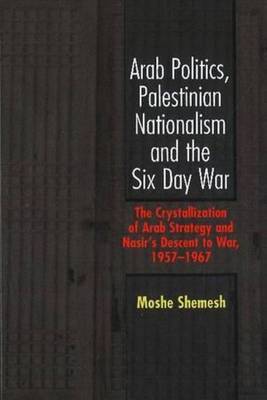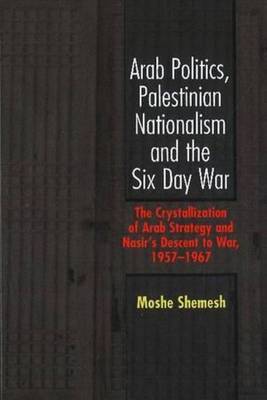
- Retrait gratuit dans votre magasin Club
- 7.000.000 titres dans notre catalogue
- Payer en toute sécurité
- Toujours un magasin près de chez vous
- Retrait gratuit dans votre magasin Club
- 7.000.0000 titres dans notre catalogue
- Payer en toute sécurité
- Toujours un magasin près de chez vous
Arab Politics, Palestinian Nationalism and the Six Day War
The Crystallization of Arab Strategy and Nasir's Descent to War, 1957-1967
Moshe Shemesh
Livre relié | Anglais
132,95 €
+ 265 points
Description
The Six Day War was the climax in the deterioration of the Arab-Israeli conflict. The downturn began in 1957 when Nasir began preaching the idea of Arab nationalism, while placing the Palestinian problem at its centre. The decade between the Sinai War and Six Day War was marked by preparations by both sides for an all-out military confrontation which both sides viewed as inevitable. As the Arab states formulated their positions on the conflict's goals and the ways of attaining them, differences of opinion erupted between Egypt and Syria. Nasir wanted to decide the time and place for the war that would 'liberate Filastin'. He was determined to meet Israel on the battlefield only when he was certain that the outcome would mean a decisive Arab victory. He consciously and strategically led Egypt to war, carefully weighing the implications of each political/military step. This study, based almost exclusively on hitherto unavailable Arab primary sources, sets out the crystallisation of Arab strategy to reveal conclusions substantively different from previous scholarly and political-military assessments. Issues dealt with include: the relevance of the Filastin problem as key to understanding the descent to war; the pivotal Syrian water struggle as a key motivating factor; Nasir's military blunders with respect to advice received from the Egyptian High Command; Nasir's acceptance of the principle that Egypt had to absorb the first Israeli strike, to be followed by Egypt's delivery of a second, decisive strike; the "political process" approach to solving the conflict as evidenced by the Khartoum protocols notwithstanding the "1948 refugee problem"; and the Hashemite regime's response to Palestinians' heightened national awakening. The enlistment of all the Arab states to Nasir's moves in May 1967 testifies not only to the president's charismatic leadership, but also to the depths of the 1948 trauma (al-nakba), which lies at the heart of any future compromise or agreement.
Spécifications
Parties prenantes
- Auteur(s) :
- Editeur:
Contenu
- Nombre de pages :
- 345
- Langue:
- Anglais
Caractéristiques
- EAN:
- 9781845191887
- Date de parution :
- 25-11-07
- Format:
- Livre relié
- Format numérique:
- Ongenaaid / garenloos gebonden
- Dimensions :
- 173 mm x 246 mm
- Poids :
- 793 g

Les avis
Nous publions uniquement les avis qui respectent les conditions requises. Consultez nos conditions pour les avis.






